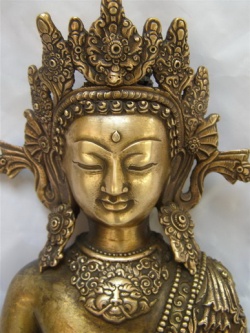Wisdom as Risk-Awareness
by Stephen Greenspan, Ph.D.
I want to say a few words about wisdom, a concept often described as the opposite of foolishness (the main focus of this column). Few concepts have been written about more than wisdom, but if you read an edited book in which twenty psychologists opine about wisdom, you will find twenty different definitions. Most of these definitions focus on cognition, especially non-academic cognition (e.g., buying a car as opposed to solving a math problem), but it may be that the essence of wisdom is more affective or motivational than cognitive. What I mean by this is that people we think of as wise have good control over their emotions and are able to resist temptations that might get them in trouble. This aspect of wisdom as what I have termed “risk-awareness” is hardly emphasized at all in the academic wisdom literature, although one can find glimpses of it in religious writings about wisdom, particularly in generally deity-free Eastern religions such as Buddhism and Taoism.
In Eastern religions, wisdom has mainly to do with awareness of the risk from bad behavior to the attainment of enlightenment and happiness. Western religions, such as Juadaism and Christianity, also discuss risks run by unwise people, but the emphasis is more on risk of retributution (plague and leprosy in Judaism; eternal damnation in Christianity) from an unforgiving and omnipotent deity. An exception can be found in Tibetan Buddhism, a relatively mystical variant, which places much emphasis on reincarnation. In a classic of Tibetan Buddhism, The Sutra of the Wise and Foolish, the argument is advanced that troubles in one’s current life were likely caused by foolish behavior in a former life, and that foolish action in the present is likely to bring bad consequences in one’s next life.
The essence of foolishness in Buddhism is to be found in the reliance on inadequate thinking, whose inadequacy stems from the fact that it does not recognize danger, even when it is fairly obvious or pointed out by wiser heads. An example can be found in the story of the “Wise Birds and Foolish Birds’” told in Buddhist Tales for Young and Old. The story goes as follows: “Once upon a time, there was a giant tree in the forest. Many birds lived in this tree. And the wisest of them was their leader. One day the leader bird saw two branches rubbing against each other. They were making wood powder come falling down. Then he noticed a tiny wisp of smoke rising from the rubbing branches. He thought, "There is no doubt a fire is starting that may burn down the whole forest.” So the wise old leader called a meeting of all the birds living in the great tree. He told them, "My dear friends, the tree we are living in is beginning to make a fire. This fire may destroy the whole forest. Therefore it is dangerous to stay here. Let us leave this forest at once!" The wise birds agreed to follow his advice, and they flew away to another forest in a different land. But the birds who were not so wise said, "That old leader panics so easily. He imagines crocodiles in a drop of water! Why should we leave our comfortable homes that have always been safe? Let the scared ones go. We will be brave and trust in our trees!" Lo and behold, in a little while the wise leader's warning came true. The rubbing branches made sparks that fell in the dry leaves under the tree. Those sparks became flames that grew and grew. Soon the giant tree itself caught fire. The foolish birds who still lived there were blinded and choked by the smoke. Many, who could not escape, were trapped and burned to death. The moral is: Those who ignore the advice of the wise do so at their own risk.”
This definition of foolishness as a failure to heed wise warnings of danger can be found in many of the parables in The Lotus Sutra, a book whose attribution to Gautama Siddharta (“the Buddha”) is disputed but which is, nevertheless, considered to be one of the most evolved statements of Buddhist doctrine. In one important parable, the Buddha tells a story (also involving fire) to a disciple about a rich man who had many children living in a large house that was in pretty bad repair. A fire broke out and the man had the sense to run outside but his children did not recognize the danger. Even when the man called to them and told them of the need to come outside, the children refused to leave because they were too attached to their carts and other playthings inside the house. Knowing that his children cared mainly about their playthings, the man bribed them by telling them that they would each receive three carts if they came outside. This ruse worked and the man’s children finally heeded his warning. Most of the commentary on this parable focuses on the importance--for formal Buddhist doctrine--of the old man giving his sons one big cart rather than three smaller ones, and fails to make note (perhaps because it is so obvious) of the dangers flowing from an over-emphasis on material possessions.
In Buddhism, foolishness is considered, along with anger and greed to be one of the “three evils”, also known as the “three poisons”, but is more fundamental because greed and anger are thought to be facilitated by foolishness. These are considered destructive impulses that “are the essence of all the delusions and negative workings of life that impede the realization of our full potential for happiness and creativity.” Foolishness, also known as “fundamental darkness”, is defined in Buddhist writings as ignorance of the true nature of life. This true nature involves connectedness to others and to the broader good. Foolishness can be willful (driven by competitive impulses, for example) or passive (a failure to examine how one’s behavior is undermining one’s values). Thus, foolishness in Buddhism has a cognitive component (lack of knowledge of what is important) and a motivational component (holding incorrect values). As the parables show, the consequence of being foolish, in line with the other two evils (greed and anger), is that one will behave in a manner that has ultimate negative consequences for oneself and for society.
Taoism, like Buddhism, is an Eastern philosophical/ religious system that has much to say about how to live a wise, contented and valued life. One of the key concepts in Taoism is “wu-wei”, a Chinese term meaning “non-acting.” This basically means acting naturally and without egoistic investment, in order to achieve what Liu Xiaogan termed a “balance between minimal effort and best result.” Foolishness enters into this formulation, as action that is forced (i.e., that is motivated by excessive concern about outcome) has a high potential to backfire and, thus, to be foolish. Wisdom, thus, has a “brake” mechanism against hasty action. Because foolishness usually occurs in response to challenging or motivating situations, wu-wei enables one to become less foolish as a function of becoming more detached from external temptations or provocations.
All formulations of wisdom, even by academic psychologists where affect and motivation are under-emphasized, point to the importance of experience in the acquisition of wisdom. The reasons should be obvious: (a) as we age we have almost all made mistakes and thus learned the importance to think through our actions in an informed and deliberative manner, and (b) most of us, even those who were extremely rash as youths, tend to mellow out and acquire better self-regulatory skills as we move into our thirties and forties. Not all old people are wise, but I would like to think that most us acquire greater wisdom as we become older.


